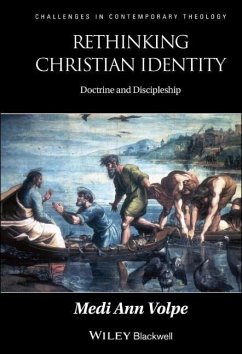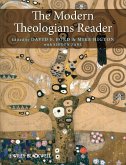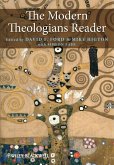Recent decades have seen major shifts in our understanding of Christian identity. This timely book explores contemporary theological theory in asking what makes a Christian in the twenty-first century.
Engages with developments in contemporary theological thought, assessing the work of leading figures Rowan Williams, John Milbank, and Kathryn Tanner
Challenges accepted ideas of Christian identity by revealing largely unexplored perspectives on how sin affects its formation
Contributes to vexed debates about Christian identity at a time when Christianity is expanding in some regions, yet in decline in many parts of the Western world
Hinweis: Dieser Artikel kann nur an eine deutsche Lieferadresse ausgeliefert werden.
Engages with developments in contemporary theological thought, assessing the work of leading figures Rowan Williams, John Milbank, and Kathryn Tanner
Challenges accepted ideas of Christian identity by revealing largely unexplored perspectives on how sin affects its formation
Contributes to vexed debates about Christian identity at a time when Christianity is expanding in some regions, yet in decline in many parts of the Western world
Hinweis: Dieser Artikel kann nur an eine deutsche Lieferadresse ausgeliefert werden.
"Kierkegaard reminded us that one can only claim to be a Christian in the 'banal sense of registry; at best, we are ever becoming one' on a journey of formation central to that becoming, as every parent knows. Acutely aware that 'identity' will never capture the result, this parent mines Christian reflection contemporary and ancient (Gregory of Nyssa) to delineate the steps in that process, helping us identify our mis-steps as well." -- David Burrell, Notre Dame
"This is a brilliant, compelling, agenda-setting book. As a growing consensus of theologians recognize the post-liberal, postmodern reality that discipleship is a training in a tradition, Volpe has written this thoughtful, passionate, informed critique that invites us all to think through precisely what is involved in being formed in the Christian tradition. This is the hard work of Christian identity. This book sets a stage for theologians, Christian educators, and practical theologians, which will transform their disciplines and create significant work for at least the next generation." -- Ian Markham, Virginia Theological Seminary
"A model for those of us who seek to combine the vocations of academic theology and pastoral ministry, Rethinking Christian Identity offers a compelling vision of Christian formation. The author focuses our attention on the center of Christian identity: being and making disciples. Volpe deftly shapes her vision in conversation with contemporary theologians (Williams, Tanner, and Milbank) and voices from the history of the Church (particularly Gregory of Nyssa). Volpe helpfully dismantles the unfortunate barrier between the tasks of academic theology and soul-care, combining erudition with a passion for Christian discipleship. A fresh voice for those who seek to serve God with both mind and heart, this book reminds us of the goal of our life before God: the continuous process of being formed in the image of Christ." -- Kathryn Greene-McCreight, St John's Episcopal Church
"This is a brilliant, compelling, agenda-setting book. As a growing consensus of theologians recognize the post-liberal, postmodern reality that discipleship is a training in a tradition, Volpe has written this thoughtful, passionate, informed critique that invites us all to think through precisely what is involved in being formed in the Christian tradition. This is the hard work of Christian identity. This book sets a stage for theologians, Christian educators, and practical theologians, which will transform their disciplines and create significant work for at least the next generation." -- Ian Markham, Virginia Theological Seminary
"A model for those of us who seek to combine the vocations of academic theology and pastoral ministry, Rethinking Christian Identity offers a compelling vision of Christian formation. The author focuses our attention on the center of Christian identity: being and making disciples. Volpe deftly shapes her vision in conversation with contemporary theologians (Williams, Tanner, and Milbank) and voices from the history of the Church (particularly Gregory of Nyssa). Volpe helpfully dismantles the unfortunate barrier between the tasks of academic theology and soul-care, combining erudition with a passion for Christian discipleship. A fresh voice for those who seek to serve God with both mind and heart, this book reminds us of the goal of our life before God: the continuous process of being formed in the image of Christ." -- Kathryn Greene-McCreight, St John's Episcopal Church
"This is an insightful work of theology, one that clearly demonstrates the ways in which classical Christian teachings can renew Christian practice." (Religious Studies Review, 1 December 2013)
"This is a substantial work that explores a considerable gap in the literature of discipleship, conversing as it does with three of the most significant contemporary theologians (unlike much literature on discipleship which ignores theology altogether. . . Academic libraries will want this book, and those interested in a way of integrating systematics and practical theology, but whether they can afford to do so is another matter (25 pence per page seems rather expensive to me, even if this hardback binding is as robust as any.) It has caused me to return to Milbank and Williams, and to explore Tanner afresh, but more significantly, to read Gregory. For that alone I am grateful to Volpe." (Regent's Reviews, 1 October 2013)
"This is a substantial work that explores a considerable gap in the literature of discipleship, conversing as it does with three of the most significant contemporary theologians (unlike much literature on discipleship which ignores theology altogether. . . Academic libraries will want this book, and those interested in a way of integrating systematics and practical theology, but whether they can afford to do so is another matter (25 pence per page seems rather expensive to me, even if this hardback binding is as robust as any.) It has caused me to return to Milbank and Williams, and to explore Tanner afresh, but more significantly, to read Gregory. For that alone I am grateful to Volpe." (Regent's Reviews, 1 October 2013)








